Duties of MPSA Officers
President. The president serves a one-year term. S/he chairs all MPSA Council meetings and appoints ad hoc committee members as needed.
President-Elect. The president-elect serves a one-year term before assuming the presidency. S/he nominates all the members of the standing committees by February.
Immediate Past President. The immediate past president serves a one-year term following their term as president. S/he or is a voting member of the MPSA Council.
Vice Presidents. Vice presidents are voting members of the MPSA Council and serve on the Finance Committee (formerly the Investment Committee). The senior vice president chairs MPSA Council meetings if the president is unable to do so.
Treasurer. The Treasurer assists the Chief Financial Officer (Executive Director) in the financial affairs of the Association and serves as the alternate signatory on financial instruments owned by the Association. The Treasurer also chairs the Finance Committee.
Executive Director. The Executive Director is the chief administrative officer and the Secretary of the MPSA and is responsible for its day-to-day operation. The Executive Director is appointed by the Council and is an Ex Officio member of the Council.
Editor(s). This appointed position serves from three to four years. The editor(s) appoints the AJPS Editorial Board, which is approved by the MPSA Council. The editor(s) oversees the American Journal of Political Science (AJPS). Editor(s) serve as Ex Officio members of the Council.
Conference Program Chair(s). The Conference Program Chairs appoint the Section heads who help select papers and organize sessions for the conference. The Program Chairs are appointed by the President, serve a one-year term, and are ex officio members of the Council.
Council Members. The Council shall have charge of the general activities of the Association, arrange for the annual meeting, create committees with appropriate powers, receive gifts and bequests, authorize the expenditure of money, and provide for auditing the accounts of the Association.
Current MPSA Officers

President (2024-2025): Christina Wolbrecht, University of Notre Dame
Christina Wolbrecht is professor of political science, director of the Rooney Center for the Study of American Democracy, and C. Robert and Margaret Hanley Family Director of the Notre Dame Washington Program. Her most recent book, A Century of Votes for Women: American Elections Since Suffrage (with J. Kevin Corder, Cambridge 2020), examines how women voted across the first 100 years since the ratification of the Nineteenth Amendment. Wolbrecht also is the co-author of Counting Women's Ballots: Female Voters from Suffrage Through the New Deal (Cambridge 2016) and the author of The Politics of Women’s Rights: Parties, Positions, and Change (Princeton 2000), both of which were recognized with political science book awards. Wolbrecht has authored or co-authored articles on such topics as women as political role models, the representation of women, and partisan position-taking on education policy. She is co-editor, with Susan Franceschet, of the journal Politics & Gender, and a founding executive board member of WomenAlsoKnowStuff, an initiative to advance women experts in political science.

President-Elect (2024-2025); President (2025-2026): Rikhil Bhavnani, University of Wisconsin-Madison
Rikhil Bhavnani is a Professor in the Department of Political Science at the University of Wisconsin–Madison, where he serves as the Associate Chair and Director of Graduate Studies. He is also a Faculty Affiliate at the La Follette School of Public Affairs, the Data Science Institute, the Elections Research Center, and the Center for South Asia. Professor Bhavnani was previously the Director of the Center for South Asia.
Professor Bhavnani’s research focuses on the political economy of development and migration, and on inequalities in political representation, mainly in South Asia. He is currently working on a book, joint with Saumitra Jha, on the conditions under which mass, nonviolent mobilizations can succeed. Professor Bhavnani is the co-author, with Bethany Lacina, of a book on the backlash against within-country migration across the developing world, published by Cambridge University Press. His papers have been published in various journals, including the American Political Science Review, the American Journal of Political Science, and the Journal of Politics.
Prior to starting at UW–Madison, Professor Bhavnani was a visiting fellow at the Center for the Study of Democratic Politics at Princeton University. He has worked at the Center for Global Development and the International Monetary Fund, and received a PhD in political science and an MA in economics from Stanford University, and a BA in political science and economics from Yale University. Professor Bhavnani’s pronouns are he/him.

Treasurer (2024-2025): Kyle Saunders, Colorado State University
Kyle L. Saunders is Professor of Political Science and Co-Director of the Institute for Research in the Social Sciences at Colorado State University. Professor Saunders' studies and interests include American politics, with particular emphases on political parties, political behavior, public opinion, elections, public policy, and research methodology; as such he has written on myriad topics including polarization, misinformation and conspiracism, public interest in politics, sustainability and many other important issues that affect public policy. Saunders has authored or co-authored over 35 peer-reviewed research articles and book chapters, work that can be found in some of the most highly visible journal outlets in the discipline of political science, including the American Journal of Political Science, the Journal of Politics, Political Behavior, the British Journal of Political Science, and Comparative Political Studies.
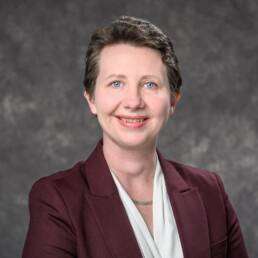
Past President (2024-2025): Eleanor Neff Powell, University of Wisconsin, Madison
Eleanor Neff Powell is the Booth Fowler Associate Professor of Political Science at the University of Wisconsin-Madison. Her research focuses on the U.S. Congress and revolves around three themes: the influence of money in American politics, understanding political parties, and exploring the complexities of congressional representation. Her research has appeared in the Journal of Politics, the British Journal of Political Science, and Political Science Research and Methods among other outlets. She is a co-founder of Women in Legislative Studies.
Executive Director

Meegan Isenhour, CAE, Executive Director
Meegan Isenhour, CAE, Executive Director
Meegan Isenhour, CAE joined MPSA in 2013 and has been serving in the role of Executive Director since 2022. She is responsible for the day-to-day operations of the MPSA including staff management and coordination, human resource management, policy and procedure development and implementation, project management, and governance committees.
A graduate of Indiana University, Meegan is a Certified Association Executive® with more than twenty years of non-profit association management experience.
In her spare time, Meegan enjoys reading, hiking, traveling, and spending time with her husband, daughter, and dogs.
2023-2025 AJPS Co-Editors

Kathleen Dolan, University of Wisconsin – Milwaukee
Kathleen Dolan is Distinguished Professor in the Department of Political Science at the University of Wisconsin Milwaukee and Co-Editor in Chief of American Journal of Political Science. She received her Ph.D from the University of Maryland. Her research focuses on gender politics, public opinion, elections, and voting behavior, with a specific focus on how the public evaluates women candidates. Dolan is the author of two books: When Does Gender Matter? Women Candidates and Gender Stereotypes in American Elections (Oxford University Press, 2014) and Voting for Women: How the Public Evaluates Women Candidates (Westview Press, 2004). Her work has also appeared in numerous peer-reviewed journals. She has served as co-editor of the journal Politics & Gender and as a member of the board of the American National Election Studies.

Jennifer L. Lawless, University of Virginia
Jennifer L. Lawless is the Leone Reaves and George W. Spicer Professor of Politics at the University of Virginia, where she’s also the Department Chair. Lawless’ research focuses on political ambition, campaigns and elections, and media and politics. She is the author or co-author of seven books, including Women on the Run: Gender, Media, and Political Campaigns in a Polarized Era (with Danny Hayes) and It Still Takes a Candidate: Why Women Don't Run for Office (with Richard L. Fox). Her research, which has been supported by the National Science Foundation, has appeared in numerous academic journals, and is regularly cited in the popular press. She has served as editor of Politics & Gender and as a member of the board of the American National Election Studies. She graduated from Union College with a B.A. in political science, and Stanford University with an M.A. and Ph.D. in political science.
2025 Conference Program Co-Chairs:

Hans C. Noel, Georgetown University
Hans Noel is Associate Professor of Government at Georgetown University. His research is on political coalitions, political parties and ideology, with a focus on the United States. He is the author of Political Ideologies and Political Parties in America, and a co-author of The Party Decides: Presidential Nominations Before and After Reform and of Political Parties. His work has appeared in the American Political Science Review, the Journal of Politics and Perspectives on Politics, among other journals. He received his Ph.D. from UCLA in 2006 and a BS in journalism from Northwestern in 1994.

Jae-Jae Spoon, University of Pittsburgh-Pittsburgh Campus
Vice Presidents
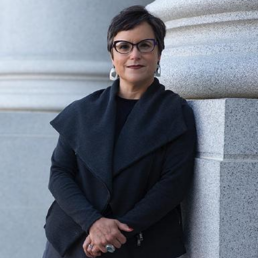
Lisa García Bedolla, UC Berkeley (2022-2025)
Lisa García Bedolla, UC Berkeley (2022-2025)
Lisa García Bedolla is Berkeley's Vice Provost for Graduate Studies and Dean of the Graduate Division, and a Professor in the Graduate School of Education. She uses the tools of social science to reveal the causes of political inequalities in the United States, considering differences across the lines of ethnorace, gender, class, geography, et cetera. She has used a variety of social science methods – participant observation, in-depth interviewing, survey research, field experiments, and geographic information systems (GIS) – to shed light on this question.
She has published six books and dozens of research articles, earning five national book awards and numerous other awards. She has consulted for presidential campaigns and statewide ballot efforts and has partnered with over a dozen community organizations working to empower low-income communities of color. Through those partnerships, she has developed a set of best practices for engaging and mobilizing voters in these communities, becoming one of the nation’s foremost experts on political engagement within communities of color.
Professor García Bedolla earned her PhD in political science from Yale University and her BA in Latin American Studies and Comparative Literature from UC Berkeley.
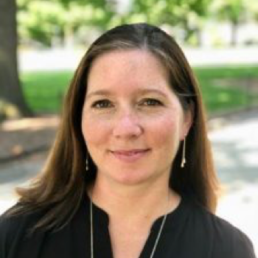
Jessica Weeks, University of Wisconsin (2023-2026)
Her research has appeared in journals including the American Political Science Review, the American Journal of Political Science, the Journal of Politics, International Organization, and World Politics. Her book, Dictators at War and Peace, explores the domestic politics of international conflict in dictatorships, and was published in 2014 in the Cornell Studies in Security Affairs Series at Cornell University Press. Weeks is the 2018 recipient of the International Studies Association Karl Deutsch Award, recognizing the scholar under 40 who has made the most significant contribution to the study of international relations. Professor Weeks received her B.A. in political science from The Ohio State University in 2001, a Master’s degree in international history from the Graduate Institute of International and Development Studies in 2003, and a PhD in political science from Stanford University in 2009. Prior to joining the Wisconsin faculty, Professor Weeks was an Assistant Professor of Government at Cornell University.

Candis Watts Smith, Duke University (2024-2027)
Candis Watts Smith is Professor of Political Science at Duke University, where she also received her B.A., M.A., and Ph.D. in Political Science. Her research expertise highlights the role race, racism, and structural inequality play in shaping the American political landscape. She the author or co-author of Black Mosaic: The Politics of Black Pan-Ethnic Identity (NYU Press, 2014), Stay Woke: A People’s Guide to Making Black Lives Matter (NYU Press, 2019); Racial Stasis: The Millennial Generation and the Stagnation of Racial Attitudes in American Politics (University of Chicago Press, 2020); and The History of Race and Politics in America, 1968-Present (Audible Original, 2022). Candis is a co-host of the Democracy Works podcast, and she has given a TED talk on three myths about racism in America that has been viewed over 2 million times.
2022-2025 Council Members:

Laurel Elder, Hartwick College
Laurel Elder is a Professor of Political Science at Hartwick College in New York where she teaches courses in American politics. She received her PhD from The Ohio State University and her BA from Colgate University. Her research, which has received national attention, explores the relationship of parenthood and politics; public perceptions of candidate spouses; women's continued underrepresentation in U.S. elective offices; and abortion attitudes in a post-Roe America. She has authored or co-authored three books and dozens of peer reviewed articles and book chapters on these topics. In her work in and out of the classroom, her overarching goal is to help promote informed and engaged citizenship.

Gbemende Esubiyi Johnson, University of Georgia

Zaryab Iqbal, Penn State University

Jason Roberts, University of North Carolina

Rocío Titiunik, Princeton University
Rocío Titiunik is Professor of Politics at Princeton University, where she is also an associated faculty with the Department of Operations Research and Financial Engineering, the Center for Statistics and Machine Learning, the Program in Latin American Studies, the Center for the Study of Democratic Politics, and the Research Program in Political Economy. She specializes in quantitative methodology for the social and behavioral sciences, with emphasis on quasi-experimental methods for causal inference and program evaluation. Her research interests lie at the intersection of political economy, political science, statistics, and data science, particularly on the development and application of quantitative methods to the study of political institutions. Her recent methodological research includes the development of statistical methods for regression discontinuity (RD) designs. Her recent substantive research centers on democratic accountability and the role of party systems in developing democracies. She received the Emerging Scholar Award from the Society for Political Methodology in 2016, which honors a young researcher who is making notable contributions to the field of political methodology, and was elected as fellow of the Society for Political Methodology in 2020. She is currently associate editor for Science Advances and a member of the Board of Reviewing Editors for Science.
2023-2026 Council Members:

Lawrence Ezrow, University of Essex
Lawrence Ezrow is a Professor of Government at the University of Essex. He also served as the Chair for the Department of Government from 2016-2019, and as Section Chair for the “Representation and Electoral Systems” Section of the American Political Science Association from 2015-2017. His research interests include elections, political representation, parties’ election strategies, policy diffusion, and European Politics. He has published articles in the American Journal of Political Science, American Political Science Review, British Journal of Political Science, Comparative Political Studies, European Journal of Political Research, International Studies Quarterly, Journal of Politics, Journal of Public Policy, Party Politics, Political Science Research and Methods, Research and Politics, West European Politics, and World Politics.

Andrew Little, University of California-Berkeley

Sally Nuamah, Northwestern University
AWARD-WINNING SCHOLAR. AUTHOR. ADVOCATE. FOUNDER. FILMMAKER.
I am a professor (tenure-track) at Northwestern University. Previously, I held appointments at Duke University, the University of Pennsylvania, Harvard University and Princeton University.
My research sits at the intersections of race, gender, public institutions and political behavior. My newest book, Closed for Democracy, is on how public school closures undermine the citizenship of Black Americans (Cambridge University Press). Research from this book was recently published in the American Political Science Review and Perspectives on Politics.
My newest research is focused on the punishment of Black women and girls and its political consequences. An article based on this work was named the “Best Paper on Intersectionality” from the American Political Science Association (APSA), and awarded the Rodney Higgins “Best Faculty Paper” from the National Conference of Black Political Scientists (NCOBPS).
My first book, How Girls Achieve (2019) highlights how the biased educational experiences of Black girls in the U.S. and Africa limit their ability to achieve democratic equity. It received the 2020 Prose Award in Education Practice and Social Science by the American Publishers Association; the 2020 Critics’ Choice Book Award from the American Educational Studies Association, and the 2021 Jackie Kirk Outstanding Book Award from the Comparative International Education Society.
In addition to research, I advocate for Black girls. I am the founder of Herstory: the TWII Foundation Girls Scholarship. I have an award winning film titled, HerStory, based on this work. Recently, I was named one of Forbes Magazine “30 Under 30” in education, awarded the Andrew Carnegie Fellowship, aka “the Brainy Award,” and named a recipient of the Marilyn Gittell Award for Scholarship and Activism.
Follow me on twitter @sally_nuamah

Cameron Thies, James Madison College Michigan State University
Cameron G. Thies is dean of James Madison College and MSU Foundation Professor. Thies is a scholar of international relations who has published broadly in foreign policy analysis, conflict processes, international political economy, and international relations theory. He is currently a co-investigator on a Department of Defense Minerva Research Initiative project entitled “Chinese Economic Power and the Effects of U.S. Economic Interdependence.” He has previously served as Editor of Political Science Research & Methods and Foreign Policy Analysis, and now serves as the Deputy Lead Editor of the Journal of Politics. He was named the Distinguished Scholar of Foreign Policy Analysis (2016), the Quincy Wright Distinguished Scholar (2017), and the Ole R. Holsti Distinguished Scholar (2020) of the International Studies Association. Thies also served as the President of the International Studies Association (2019-2020).
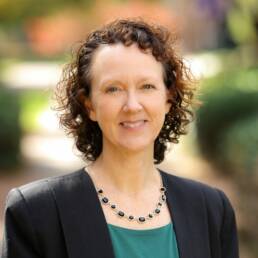
C. Danielle Vinson, Furman University
C. Danielle Vinson is a Professor of Politics and International Affairs at Furman University. After completing her PhD in political science at Duke University, she joined the faculty at Furman in 1995 and served as the Chair of the Political Science Department from 2009-2015. Her teaching and research interests focus on institutions in American government with a particular emphasis on Congress and the media. She teaches courses on Congress, the Presidency, Media and Politics, Humor and Politics, and American Government and regularly directs the Department’s Washington internship program. She also teaches a course on Native American Politics. She is the author of the books Local Media Coverage of Congress and Its Members and Congress and the Media: Beyond Institutional Power. She has written articles and chapters on Congress and the media, political parties and the media, religion and politics in the media, and communication and spending in political campaigns. She won the University’s Meritorious Advising Award in 2001 and a teaching award from the South Carolina Independent Colleges and Universities. As a native South Carolinian, she is often called upon by local, national, and even international press, especially during presidential primaries, to make sense of South Carolina politics (not quite as impossible as it sounds). She has served as Furman's Faculty Athletics Representative since 2019.
2024-2027 Council Members:

Quintin Beazer, Florida State University

Olga Chyzh, University of Toronto
Olga V. Chyzh is an Associate Professor of Political Science at the University of Toronto. She earned her PhD in Political Science from the University of Iowa in 2013. Her research areas are political methodology and international relations. She has published on such topics as human rights, international trade, autocratic regimes, and network analysis. Her articles have appeared in the American Journal of Political Science, Journal of Politics, Political Analysis, and Canadian Journal of Political Science, among others.

Julie Dolan, Macalester College

Nazita Lajevardi, Michigan State University
Dr. Nazita Lajevardi is an Associate Professor in the Department of Political Science at Michigan State University. She researches issues related to public opinion and political behavior through the lens of religious and racial identity, and evaluates how stigmatized groups fare in American democracy. Broadly, her scholarship is related to race and ethnic politics, political behavior, voting rights, and immigration politics. Her scholarship has been published in numerous venues, including American Political Science Review, The Journal of Politics, Political Behavior, and Cambridge University Press, among others.
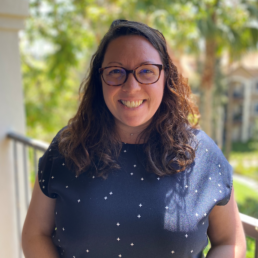
Kimberly Twist, San Diego State University
Kim Twist is Associate Professor of Political Science. She earned her Ph.D. from the University of California, Berkeley and her B.A. from New York University.
Professor Twist's research focuses on far-right extremism in Western Europe and the United States, and her book, Partnering with Extremists (University of Michigan Press, 2019), explains why mainstream-right parties in Western Europe often invite far-right parties to join them in government. Her research has been supported by a number of grants, including from the National Science Foundation.
She teaches a variety of courses in comparative politics and research methods, including statistics, European politics, British politics, and political parties. Professor Twist was the 2020-21 recipient of the College of Arts & Letters Teaching Excellence Award for tenured / tenure-track faculty. She served as Faculty-in-Residence from 2017-20 for University Towers and M@College.
Previous MPSA Officers
Past Presidents, Vice Presidents, Executive Councils and Executive Directors
